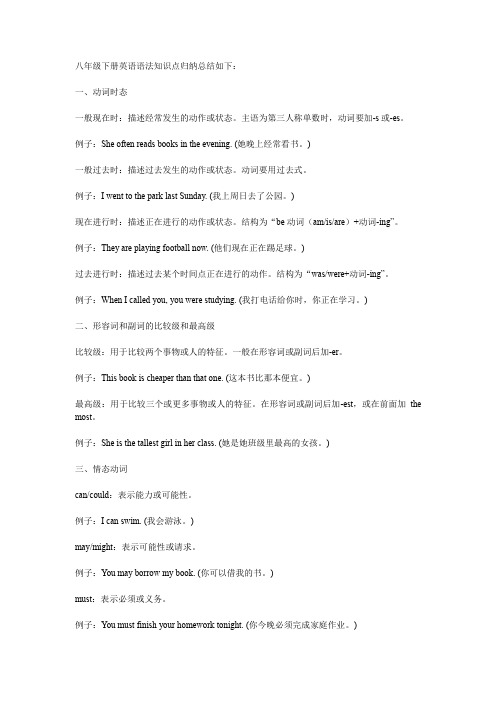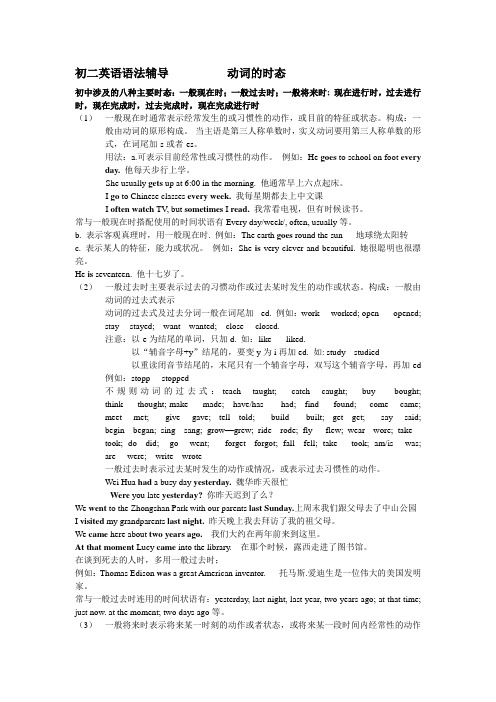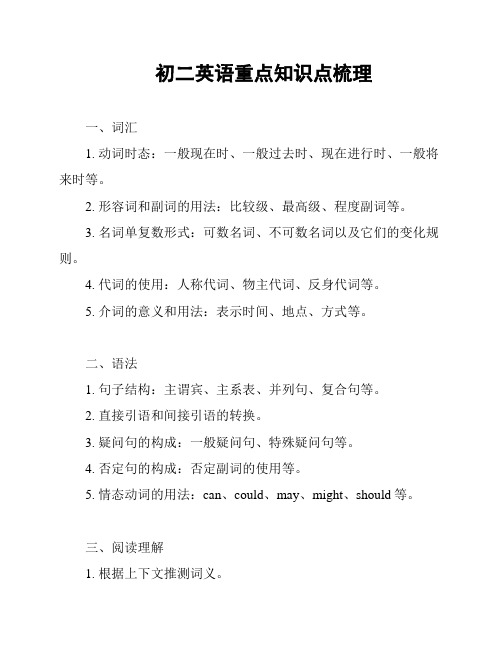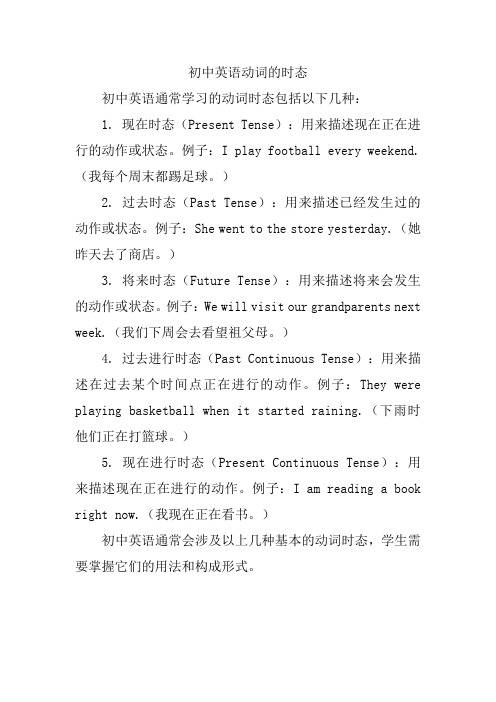初二英语必考—动词时态
八年级下册英语语法知识点归纳总结

八年级下册英语语法知识点归纳总结如下:一、动词时态一般现在时:描述经常发生的动作或状态。
主语为第三人称单数时,动词要加-s或-es。
例子:She often reads books in the evening. (她晚上经常看书。
)一般过去时:描述过去发生的动作或状态。
动词要用过去式。
例子:I went to the park last Sunday. (我上周日去了公园。
)现在进行时:描述正在进行的动作或状态。
结构为“be动词(am/is/are)+动词-ing”。
例子:They are playing football now. (他们现在正在踢足球。
)过去进行时:描述过去某个时间点正在进行的动作。
结构为“was/were+动词-ing”。
例子:When I called you, you were studying. (我打电话给你时,你正在学习。
)二、形容词和副词的比较级和最高级比较级:用于比较两个事物或人的特征。
一般在形容词或副词后加-er。
例子:This book is cheaper than that one. (这本书比那本便宜。
)最高级:用于比较三个或更多事物或人的特征。
在形容词或副词后加-est,或在前面加the most。
例子:She is the tallest girl in her class. (她是她班级里最高的女孩。
)三、情态动词can/could:表示能力或可能性。
例子:I can swim. (我会游泳。
)may/might:表示可能性或请求。
例子:You may borrow my book. (你可以借我的书。
)must:表示必须或义务。
例子:You must finish your homework tonight. (你今晚必须完成家庭作业。
)四、被动语态被动语态用于描述事物的状态或描述被动发生的动作。
结构为“be动词(am/is/are/was/were)+动词的过去分词”。
初二英语语法辅导__________动词的时态

初二英语语法辅导动词的时态初中涉及的八种主要时态:一般现在时;一般过去时;一般将来时; 现在进行时,过去进行时,现在完成时,过去完成时,现在完成进行时(1)一般现在时通常表示经常发生的或习惯性的动作,或目前的特征或状态。
构成:一般由动词的原形构成。
当主语是第三人称单数时,实义动词要用第三人称单数的形式,在词尾加-s或者-es。
用法:a.可表示目前经常性或习惯性的动作。
例如:He goes to school on foot every day.他每天步行上学。
She usually gets up at 6:00 in the morning. 他通常早上六点起床。
I go to Chinese classes every week.我每星期都去上中文课I often watch TV, but sometimes I read.我常看电视,但有时候读书。
常与一般现在时搭配使用的时间状语有Every day/week/, often, usually等。
b. 表示客观真理时,用一般现在时. 例如:The earth goes round the sun 地球绕太阳转c. 表示某人的特征,能力或状况。
例如:She is very clever and beautiful. 她很聪明也很漂亮。
He is seventeen. 他十七岁了。
(2)一般过去时主要表示过去的习惯动作或过去某时发生的动作或状态。
构成:一般由动词的过去式表示动词的过去式及过去分词一般在词尾加-ed. 例如:work----worked; open-----opened;stay--- stayed; want---wanted; close----closed.注意:以-e为结尾的单词,只加d. 如:like-----liked.以“辅音字母+y”结尾的,要变y为i再加ed. 如: study---studied以重读闭音节结尾的,末尾只有一个辅音字母,双写这个辅音字母,再加-ed 例如:stopp----stopped不规则动词的过去式:teach----taught; catch----caught; buy---- bought;think-----thought; make-----made; have/has------had; find-----found; come----came;meet----met; give----gave; tell---told; build--- built; get---get; say----said;begin---began; sing---sang; grow—grew; ride---rode; fly--- flew; wear---wore; take--- took; do---did; go----went; forget---forgot; fall---fell; take--- took; am/is----was;are----were; write---wrote一般过去时表示过去某时发生的动作或情况,或表示过去习惯性的动作。
初中英语知识归纳总结——动词的时态

初中英语知识归纳总结——动词的时态动词的时态(一)教学重点一般现在时在英语中,不同时间里以不同方式发生的动作或存在的状态,要用不同的动词形式来表示,动词的这种不同形式称为动词的时态。
时态从时间上划分,可分为四大类:现在时;过去时;将来时;过去将来时。
从行为上,每一类可以分为四种形式:一般式;进行式;完成式;完成进行式。
这样英语的动词合起来,总共有十六种时态,初中只需掌握其中的八种时态。
1、一般现在时(1)一般现在时表示现在的状态、习惯性的动作或主语所具备的性格和能力等。
①当动词是be时,第一人称用am,第二人称用is,其他人称用are.②当动词是实义动词时,一般用动词原形,但如果主语是第三人称单数时,动词必须用第三人称单数形式,其变化规则如下:助动词do(第三人称单数用does)构成否定句、疑问句及答语,但要注意助动词后原来的谓语动词要恢复原形。
例如:I like music.I don’t like music.Do you like music?Yes, I do No, I don’t(2)一般现在时的用法①表示经常、习惯性动作,常和often, usually, every day, sometimes, always 等时间状语连用。
如:He goes to school by bus every day.They often play football②表示能力、职业、特征。
如:Miss Gao teaches English.Do you speak Japanese?③表示客观存在。
如:The earth moves round the sun.Time and tide wait for no man.④表示已经安排好或计划好的事。
如The plane takes off at 7:30.Classes begin at 8:00⑤在时间状语和条件状语从句中,主句用一般将来时,从句用一般现在时。
初二英语动词时态试题

初二英语动词时态试题1. -Where is Jim?-He_______ the teachers' office.A.went to B.has been toC.has gone to D.was in【答案】C【解析】句意:吉姆在哪?他去了老师办公室。
has been to表示去过某地;has gone to表示去了某地。
结合句意,故选C【考点】考查时态的用法。
2. I want to know if it is going to rain next week. If it , I have to stay at home.A、doesB、isC、will【答案】A【解析】句意为:我想知道下周是否会下雨,如果下雨,我必须呆在家里。
根据语境,这里指的是“下雨”这回事。
在句中为了避免重复,因此使用代代词do。
由于主语是第三人称单数,时态是一般现在时。
故选A。
【考点】考查动词时态。
3. Since2000, it has become a new town. Everything _________.A.changed B.was changedC.had changed D.has changed【答案】D【解析】句意:自从2000年以来,这儿已经变成了一个新的城镇。
一切都改变了。
结合语境可知本句描述的是现在已经完成的动作,故用现在完成时态。
选D。
【考点】考查时态辨析4. When I got there, they the old people clean the house.A、helpedB、are helpingC、were helping【答案】C【解析】句意:当我到那的时候,他们正在帮老人打扫房间。
when引导时间从句用过去时,主句用过去进行时,结合句意,故选C【考点】考查时态的用法5. ---Let’s go fishing if it _______ this weekend.--- But nobody knows if it _________.A.is fine; will rain B.will be fine; rainsC.is fine; will be rain D.will be fine;will rain【答案】A【解析】句意:——如果这个周末天气好,我们去钓鱼吧。
初二英语重点知识点梳理

初二英语重点知识点梳理
一、词汇
1. 动词时态:一般现在时、一般过去时、现在进行时、一般将来时等。
2. 形容词和副词的用法:比较级、最高级、程度副词等。
3. 名词单复数形式:可数名词、不可数名词以及它们的变化规则。
4. 代词的使用:人称代词、物主代词、反身代词等。
5. 介词的意义和用法:表示时间、地点、方式等。
二、语法
1. 句子结构:主谓宾、主系表、并列句、复合句等。
2. 直接引语和间接引语的转换。
3. 疑问句的构成:一般疑问句、特殊疑问句等。
4. 否定句的构成:否定副词的使用等。
5. 情态动词的用法:can、could、may、might、should等。
三、阅读理解
1. 根据上下文推测词义。
2. 根据文章内容回答问题。
3. 阅读短文选取正确答案。
4. 阅读短文填空。
四、写作技巧
1. 写作格式:书信、日记、应用文等。
2. 写作内容:自我介绍、描述人物、事件、旅行经历等。
3. 句型转换:改写句子时注意语法和意思要保持一致。
4. 语言表达:使用恰当的词汇和句式进行表达。
以上是初二英语的重点知识点梳理,掌握了这些知识,能够帮助你更好地理解和使用英语,提高你的研究效果和应试能力。
初中英语动词的时态

初中英语动词的时态
初中英语通常学习的动词时态包括以下几种:
1. 现在时态(Present Tense):用来描述现在正在进行的动作或状态。
例子:I play football every weekend.(我每个周末都踢足球。
)
2. 过去时态(Past Tense):用来描述已经发生过的动作或状态。
例子:She went to the store yesterday.(她昨天去了商店。
)
3. 将来时态(Future Tense):用来描述将来会发生的动作或状态。
例子:We will visit our grandparents next week.(我们下周会去看望祖父母。
)
4. 过去进行时态(Past Continuous Tense):用来描述在过去某个时间点正在进行的动作。
例子:They were playing basketball when it started raining.(下雨时他们正在打篮球。
)
5. 现在进行时态(Present Continuous Tense):用来描述现在正在进行的动作。
例子:I am reading a book right now.(我现在正在看书。
)
初中英语通常会涉及以上几种基本的动词时态,学生需要掌握它们的用法和构成形式。
初二英语常用语法知识——动词时态测试(含答案)
一、选择题1.Lily and Lucy _______ their mother. They have big eyes and yellow hair.A.like both B.both are like C.both like D.are both like D解析:D【解析】【分析】【详解】句意:莉莉和露西都像他们的母亲。
他们有大眼睛和黄头发。
be like表示像……,both副词,两者都,放在be动词,助动词,情态动词之后,实意动词之前。
like动词,喜欢,根据题意,排除AC;both放在动词are之后,排除B。
根据题意,故选D。
2.Kay looked _________ at the guests who said that the food she cooked tasted _________. A.happily; wonderfully B.happily; wonderfulC.happy; wonderful D.happy; wonderfully B解析:B【解析】【详解】句意:Kay高兴地看着客人,他们说她做的菜味道好极了。
考查实义动词与系动词用法。
本题中“looked _______ at”中的look表示“看”这个动作,在此句中属于实义动词,应用副词happily来修饰;“she cooked tasted ______”中的taste“尝起来”属于感官动词,其后应接形容词wonderful来表示“尝起来味道很好”。
故选B。
3.These chicken wings taste ________. I want more.A.well B.wonderfully C.nice D.bad C解析:C【解析】【详解】句意:这些鸡翅尝起来不错。
我想要更多。
考查感官动词的用法及形容词辨析。
well好,副词;wonderfully精彩地;nice好的;bad 坏的。
初二英语(动词时态+状语从句+非谓语动词+特殊考点)
专项复习:动词时态一般现在时【考点笔记】1.动词的第三人称词尾变化当主语是第三人称单数时,谓语动词需加-s或-es:2. 一般现在时的用法1)表示经常的或习惯性的动作,常与表示频度的副词连用。
常用的频度副词有: always、often、 usually、sometimes,seldom、never。
频度副词在句中通常放在行为动词之前,系动词、助动词之后。
Eg, I often go to school by bike.Tom always gets up at 8:00am.2)表示现在的状态。
Eg,Tom studys very hard now.3)表示主语具备的性格、特征和能力等。
Eg, He can speak five foreign languages .That is a beautiful city .Changjiang River is one of the longest rivers in the world.4)表示客观真理,客观存在,自然现象。
Eg, The sun rises in the east .The earth goes around the sun .Ten minus two is eight.Light travels faster than sound .The United States lies by the west coast of the Pacific Ocean. 5)表示按计划或安排好的,或将要发生的动作,可用一般现在时表将来。
但只限于start,begin,leave,go,come,arrive,return,take place等。
Eg, Here comes the bus.English class begins at 8:00.6)在复合句中,当主句是一般将来时,时间或条件状语从句的谓语动词只能用一般现在时来表示将来要发生的动作。
初二英语语法重点总结归纳
初二英语语法重点总结归纳英语语法是英语学习的基础,掌握语法规则对于提高英语水平至关重要。
初二是英语学习的关键阶段,本文将对初二英语语法重点进行总结和归纳,帮助同学们更好地理解和运用英语语法。
一、动词时态1.一般现在时:表示经常发生或习惯性的动作和状态。
例句:He goes to school by bus every day.2.一般过去时:表示过去某个时间发生的动作或存在的状态。
例句:She visited her grandparents last weekend.3.一般将来时:表示将来要发生的动作或状态。
例句:They will have a party next week.4.现在进行时:表示正在进行的动作。
例句:My mother is cooking dinner.5.过去进行时:表示过去某个时间正在进行的动作。
例句:While he was watching TV, his friend called him.二、被动语态1.一般现在时的被动语态:am/is/are + 过去分词。
例句:The window is cleaned by him every week.2.一般过去时的被动语态:was/were + 过去分词。
例句:The book was written by his father.3.一般将来时的被动语态:will be + 过去分词。
例句:A new school will be built in our community next year.三、情态动词1.can/may:表示能力、请求或可能性。
例句:He can speak English fluently./ You may go out now.2.must:表示必须、一定。
例句:You must study hard for the exam.3.should:表示应该、建议。
例句:You should eat more vegetables.四、名词性从句1.主语从句:从句在句子中作主语。
初二英语必考知识点
初二英语必考知识点一、时态1. 一般现在时:表示经常发生的动作或现在的状态。
- 例句:She often reads books in the library.2. 一般过去时:表示过去发生的动作或状态。
- 例句:He visited the museum last Saturday.3. 一般将来时:表示将来会发生的动作或计划。
- 例句:We will travel to Japan next year.4. 现在进行时:表示正在进行的动作。
- 例句:They are playing soccer on the playground.5. 过去进行时:表示过去某一时刻正在进行的动作。
- 例句:She was watching TV when I called her.6. 将来进行时:表示将来某一时刻正在进行的动作。
- 例句:He will be working at that time tomorrow.二、语态1. 被动语态:强调动作的承受者。
- 例句:The book was written by the famous author.三、非谓语动词1. 动名词:作为名词使用,表示动作。
- 例句:Swimming is my favorite sport.2. 分词(现在分词和过去分词):作为形容词或副词使用。
- 例句:The crying baby needs his mother. (现在分词) - 例句:Broken glasses are dangerous. (过去分词)四、情态动词1. can/could:表示能力或许可。
- 例句:She can speak three languages.2. may/might:表示可能性或许可。
- 例句:It might rain later.3. must:表示必须或强烈义务。
- 例句:You must finish your homework.4. should/ought to:表示建议或义务。
- 1、下载文档前请自行甄别文档内容的完整性,平台不提供额外的编辑、内容补充、找答案等附加服务。
- 2、"仅部分预览"的文档,不可在线预览部分如存在完整性等问题,可反馈申请退款(可完整预览的文档不适用该条件!)。
- 3、如文档侵犯您的权益,请联系客服反馈,我们会尽快为您处理(人工客服工作时间:9:00-18:30)。
小爽寒假带你弯道超车!春季稳扎稳打!顺利进入初三!四大时态一、单选题(共40题;共80分)1.We _______ the Great Wall three days ago.A. didn't went toB. didn't go toC. weren't go toD. go to2.— Hi, Kate. You look tired. What's the matter?— I _______ well last night.A. didn't sleepB. don't sleepC. sleptD. sleep3.— Where ______ you ______ on vacation?— I went to New York City.A. did, goB. are, goingC. will, goD. do, you4.We _______ eleven lessons last term.A. learnB. learnedC. learnsD. learning5.— What did you do last vacation?— I ______ at home.A. stayB. will stayC. staiedD. stayed6.—You look nice in your new skirt today.—Oh, really? I it when it was on sale.A. buyB. boughtC. am buyingD. will buy7.He ______ go to bed until he ______ his homework yesterday evening.A. did not, finishB. did, finishedC. did not, finishedD. /, finished8.—Where he go on vacation?—He went to the mountains.A. isB. doesC. hasD. did9.I usually up late on Sunday mornings, but I up early last Sunday morning.A. get; gotB. got; getC. got; gotD. get, get10.—__________ you often go to the beach?—No, but I __________ last Sunday.A. Did; wantB. Do; didC. Did; doD. Do, go11.In five years, Sally ______ a basketball player.A. wasB. isC. will beD. will12.— How is the weather tomorrow?— I don't know if it ________ tomorrow. If it ________, I'll stay at home.A. will rain; rainsB. rains; will rainC. will rain; will rainD. rains; rains13.— Jim, can you help me to wash the dishes?— Sorry, Dad. I ________ to play football.A. goB. wentC. am goingD. have been14.— What is she going to ________ next weekend?— She is going to travel to Japan.A. haveB. havingC. doD. doing15.If he's available, he ________ around the world.A. travelB. will travelC. travelsD. are going to travel16.There ________ a football game this afternoon. Let's go and watch it.A. is going to haveB. will haveC. is going to beD. is going to17.—Have you washed the clothes?—Not yet. But I _________ them in half an hour.A. washedB. have washedC. will washD. wash18.There _________two basketball matches tonight.A. will haveB. are going to haveC. are going to beD. will be going to be19.— Why are you in such a hurry, Mike?— There ________ an NBA basketball game in ten minutes.A. will haveB. will beC. is going to haveD. are going to be20.—Have you watched the new movie Kungfu Yoga, Richard?—Not yet. But I ________ it with my cousin this evening.A. watchedB. was watchingC. have watchedD. will watch21.— May I speak to Jackie?— Sorry, he isn't in. He ________ a meeting.A. haveB. hadC. is havingD. to have22.Listen, a small group of children __________ in the playground.A. talkB. talksC. is talkingD. are talking23.Look! The people _______ their homes after the earthquake. I think they _______ to normal life very soon.A. are rebuilding; are returningB. are returning; are rebuildingC. will return; are rebuildingD. are rebuilding; will return24.—Where is your sister?—She TV at home.A. watchesB. will watchC. watchedD. is watching25.Where's Tom? His mother ______ him now.A. is looking forB. will look forC. has looked forD. looks for26.—Look at the boys on the playground.—Oh, they________ basketball. They a basketball match next Sunday.A. are playing; are going to haveB. play; haveC. play; had27.— Mum, where is Dad?— He _________ flowers in the garden now.A. plantedB. plantsC. will plantD. is planting28.—Could I use your computer to send an e-mail?—Sure, but you must wait a few minutes. I _______ some information about Easter.A. downloadedB. downloadC. am downloadingD. was downloading29.Tomorrow is Dragon Boat Day. My mother and my grandma _________ a big meal for our family now.A. are preparingB. be preparingC. prepareD. prepared30.He ______ his homework at school.A. doesn'tB. don't doC. don'tD. doesn't do31.When he ______, he ______ to be a policeman.A. grow up; wantB. grows up; wantC. grows up; wantsD. grow up; wants32.My uncle said that the moon around the earth.A. movedB. movesC. was movingD. has moved33.— Is your mother a teacher?— Yes, she is. She ________ at a junior high school.A. taughtB. teachesC. will teachD. is teaching34.— Tina the piano in the music club every Sunday?—Yes. From 3:00 p.m. to 4:30 p.m. every Sunday.A. Is; playingB. Does; playC. Did; playD. Will; play35.Tom's mother works in a hospital and she a car to work every day.A. is drivingB. will driveC. droveD. drives36.If you ________ to the park tomorrow, I ________ with you.A. go; goB. will go; will goC. go; will goD. will go; go37.—Hello. May I speak to David?—Sorry, he isn't in. He for New York five minutes ago.A. leavesB. is leavingC. leftD. was leaving38.I don't know if he to the English corner, but I'll ask him about that when he to the class.A. goes; will comeB. will go; will comeC. goes; comesD. will go; comes39.There __________ a basketball match between Grade 1 and Grade 2 on Friday afternoon.A. haveB. is going to beC. hasD. is going to have40.— There _______ a football match this evening.— Exciting news.A. are going to beB. is going to beC. is going to haveD. will have二、填空题(共10题;共20分)41.Think hard and you ________ (come) up with some good ideas.42. Lily ________ (buy) a bike last week.43.Where ________ (be) you last night?44.Jim ________ (go) to the library this morning.45.It ________ (rain) yesterday.46.Ann ________ (go) to the police station this morning.47.Look! The students ________ (swim) in the river.48.— Can you go to the mall tomorrow?— I'm sorry I can't. I ________ (help) my sister with math.49.Look! She is________ (pour) the milk into the blender.50.She ________ (be) a pretty girl. Look, she ________ (dance).答案解析部分一、单选题1.【答案】B【考点】过去发生的动作或存在的状态【解析】【分析】时间状语three days ago.表示过去,用一般过去时,否定句需要加助动词did,后面跟动词原形,故选B。
